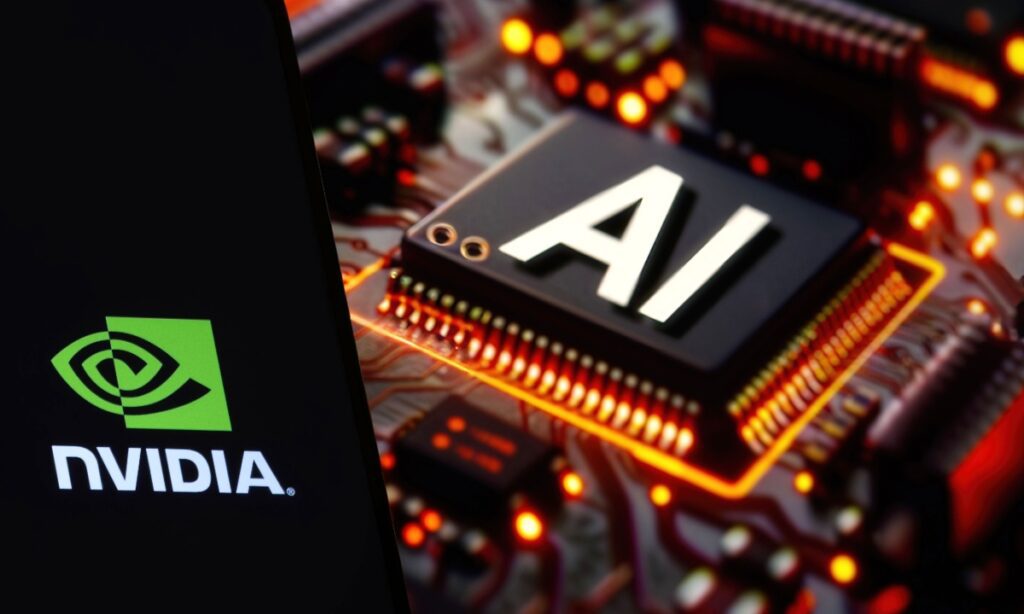Nvidia: From Gaming to AI Titan
Once famed for its gaming graphics cards, Nvidia has now firmly established itself at the forefront of the artificial intelligence (AI) revolution. As the tech powerhouse gears up to announce its second-quarter earnings this Wednesday, the spotlight is on the chipmaker that has become synonymous with the booming generative AI market.
Nvidia’s financial performance tells a remarkable story. The company’s stock has soared more than 150% this year, inflating its market valuation by approximately $1.82 trillion, fueled by an insatiable demand for its AI chips. Major technology players, including Microsoft, Google, and Meta, are racing to secure Nvidia’s GPUs, especially the highly sought-after H100 chip, which has become indispensable for training large language models that underpin applications such as ChatGPT.
The AI Gold Rush
Nvidia’s leadership in the AI chip market enables it to command premium pricing for its products. Some H100 chips are reportedly selling for over $40,000 each on the open market. This pricing power is evident from Nvidia’s impressive financial metrics, with adjusted gross margins reaching 79.1% during the first quarter.
Jensen Huang, founder and CEO of Nvidia, emphasized the transformative potential of AI, stating in a recent news release: “The next industrial revolution has begun — companies and countries are partnering with NVIDIA to transition traditional data centers to accelerated computing and establish new AI factories. AI is poised to deliver considerable productivity gains to almost every industry, aiding companies in becoming more cost-effective and energy-efficient while unlocking new revenue opportunities.”
However, Nvidia’s remarkable journey has encountered obstacles. After a brief period of decline, Nvidia’s stock saw a 20% drop in July and early August, raising investor concerns about the company’s capacity to meet soaring expectations and the sustainability of AI-related expenditures by major tech firms.
Concerns are also growing regarding potential delays in the production of Nvidia’s next-generation Blackwell AI chips. Although CEO Jensen Huang had previously indicated these chips would be available in the second quarter, analysts are now warning of design challenges that could postpone their release.
Addressing Challenges Ahead
In addition to market competition, Nvidia faces increasing regulatory scrutiny. U.S. authorities are investigating whether the company has pressured cloud providers to procure multiple products or tried to bundle networking equipment with AI chips.
Moreover, competition in the AI chip landscape is heating up. Longstanding rival AMD is making headway with its own AI processor developments, while tech behemoths like Google and Amazon are crafting custom silicon for their data centers. In China, domestic competitor Huawei is rapidly emerging as a significant player, particularly in light of U.S. export restrictions curtailing Nvidia’s operations in the region.
To navigate challenges in the Chinese market, Nvidia is reportedly developing a new line of AI processors that would comply with U.S. export regulations. These upcoming chips, speculated to be named H20, may lack the power of Nvidia’s premium offerings but could help the company retain a foothold in a vital market.
As Nvidia prepares to announce its earnings, analysts anticipate a 75% revenue growth forecast for the third quarter, projecting revenues of $31.69 billion. If realized, this would mark the end of the company’s five-quarter streak of triple-digit growth, presenting a pivotal moment for investors.
The generative AI surge has significantly transformed the tech landscape, where Nvidia has emerged as a key beneficiary. Its chips are critical infrastructure for the AI revolution, driving advancements in applications ranging from chatbots and image generators to sophisticated healthcare, finance, and scientific research tools.
Yet, critics caution that the current excitement surrounding generative AI may exceed its practical uses and economic benefits, raising ethical concerns and fears of job displacement.
For Nvidia, the road ahead requires adept navigation of these multifaceted challenges while continuing to innovate. The company’s performance in the upcoming quarters will be instrumental in determining whether it can sustain its dominant role or if market realities will temper its growth.
Nvidia’s impending earnings report serves as a crucial indicator for the entire AI sector. As the company’s fortunes become increasingly intertwined with the future of AI technology, its chips are the driving force behind the algorithms reshaping our digital landscape. As investors and tech enthusiasts scrutinize the forthcoming data, Nvidia’s ability to remain at the forefront of this transformative wave will likely dictate its future success.




